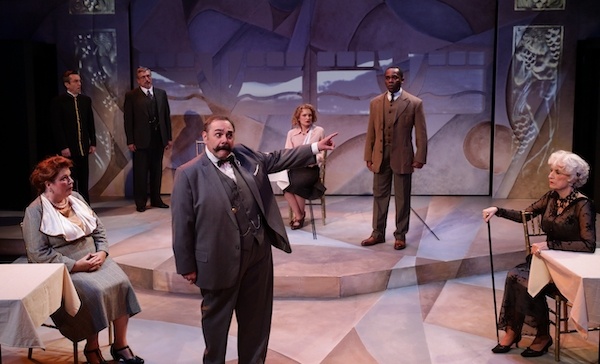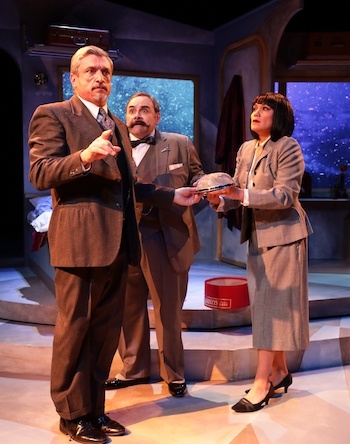Theater Review: Agatha Christie’s Murder on the Orient Express” — Neither Noir nor Romp
By Daniel Gewertz
Ken Ludwig’s stage version of Murder on the Orient Express is an enjoyable diversion.
Agatha Christie’s Murder on the Orient Express, adapted by Ken Ludwig. Directed by Spiro Veloudos. At the Lyric Stage Company, 140 Clarendon Street, 2nd Floor, Boston, MA, through December 22.

The cast of the Lyric Stage production of Agatha Christie’s Murder on the Orient Express. Photo: Mark S. Howard.
It took 40 years for Agatha Christie’s Murder on the Orient Express to make the transition from novel to movie. Directed by Sidney Lumet, that 1974 adaptation starred Albert Finney as master detective Hercule Poirot. Among the star-strewn cast: Ingrid Bergman, who won a best supporting actress Oscar. In 2017, Kenneth Branagh’s version of the mystery yarn earned merely mixed reviews, but it was a commercial success. So, it is safe to say that most of us know the Orient Express and its tricky murder plot from the movies, not Christie’s 1934 novel.
Ken Ludwig’s stage version of Murder on the Orient Express is an enjoyable diversion. Yet the use of film as a framing device brings with it an element of irony — the most striking strength of this current stage adaptation turns out to be cinematic.
From the show’s opening moments, the back of the Lyric stage space features filmed black and white moving images, created expressly for the production by projection designer Seaghan McKay. We meet little Daisy Armstrong via these filmed images: the young girl whose kidnapping and murder form the motivation for the later bloodletting on the fateful train-ride of the Orient Express. These pictures of Daisy — not still photos, but film footage — are the emotive ghost in the machine of the plot. Throughout, moving images of threatening clouds, swirling, shining snow, crystal stars, and shadows drenched in gloom lend the production a moodiness that the script lacks.
When Christie wrote the novel in 1933 she based the killing of little Daisy on the then recent, world-famous kidnapping and murder of aviator Charles Lindbergh’s child. The specter of real life horror added resonance to this whodunit. So, despite the ritzy, glamorous gang of international characters riding on the train, an underlying darkness is appropriate. But the production’s acting style is lightly comedic. And there lies the theatrical rub. Tony-winning playwright Ludwig (Lend Me a Tenor, Crazy For You, Moon over Buffalo) wrote the adaptation and his oeuvre is comedy and farce. Director Spiro Veloudos, meanwhile, a fan of film noir, wanted a deeper palette. So what we get is neither here nor there. Is it an enjoyable and well-staged play? Yes. Yet it’s neither edgy nor wacky, neither noir nor romp.
Veloudos, the Producing Artistic Director Emeritus of the Lyric, is returning to his theater for the first time since he announced his retirement. In an interview, he said that the spirit of film noir — and the use of film in the play — were chosen because he wanted the audience to “empathize with Daisy,” a character already deceased before the play begins. He also implied that detectives and noir go together. Yet noir was not around in early ’30s, the era of Murder of the Orient Express. It arose during the ’40s and ’50s, beginning with John Huston’s seminal The Maltese Falcon in 1941. Yes, Dashiell Hammett wrote Falcon in 1930, and he and Christie, born in the 1890s, were contemporaries. But Hammett’s hardboiled, urban, and violent crime narratives were a reaction against the polite, upper-class drawing-room British mystery novels perfected by Christie. Veloudos admits that, unlike America’s cynical detective writers, Christie was no fatalist. “But,” he says, “she truly has a great sense of menace.” So perhaps Christie might benefit from a noirish touch. Yet, as proved by this production, it is no easy trick to infuse the menacing shadows of noir into the comic brightness of this Orient Express.

Will McGarrahan, Remo Airaldi, and Celeste Oliva in the Lyric Stage production of Agatha Christie’s Murder on the Orient Express. Photo: Mark S. Howard.
Veteran Boston stage actor Remo Airaldi anchors Murder on the Orient Express as Hercule Poirot. He somehow manages to be simultaneously contemplative and colorful, subtle and funny. The other standout is Kerry A. Dowling as the wacky Helen Hubbard, a character as broad as a barn, and nearly as loud as a barnyard. She plays a horny, rambunctious Minnesotan who belts show tunes on a whim. She is searching for the next in a long line of husbands… or a coupling of a far shorter duration. If you could combine Groucho Marx and Margaret Dumont into one, that would be Dowling’s Hubbard. Also deserving of notice are Sarah deLima as the gracious Princess Dragomiroff; Will McGarrahan as the grand Monsieur Bouc, the director of the train line; and Celeste Olivia as the resolutely capable Countess Andrenyi. (Adapter Ludwig pared the book’s 12 suspects down to eight, so the cast could fit on a small stage. The Countess is given a background as a physician, the profession of her husband in the novel. It is always handy to have a doctor around when the corpses start piling up in a Christie tale.)
Davron S. Monroe is properly odious as the boorish lout (and womanizer) Ratchett, the tale’s overt villain. It may have been a mistake, though, to have Monroe take on a double role as Colonel Arbuthnot. True, it is common for an actor to play two small roles, but there are so many characters here — all murder suspects — that I became confused. Plus, both characters are imperious types.
There are so many ingenious plot points and details tossed at us that a few become lost in the flurry. Considering the plot’s knotty complications, though, the staging, which includes the use of sliding sets and raised platforms, is quite graceful.
A side note: Why did Ludwig, a Tony-winning playwright, choose to write a theatrical adaptation of “Murder” so soon after Branagh’s much-publicized movie release? The answer is: he didn’t. Ludwig’s effort actually opened in Princeton, New Jersey eight months before Branagh’s film debuted. The release of the film, though, may well have stopped Ludwig’s stage version from reaching New York.
For 30 years, Daniel Gewertz wrote about music, theater and movies for the Boston Herald, among other periodicals. More recently, he’s published personal essays, taught memoir writing, and participated in the local storytelling scene. In the 1970s, at Boston University, he was best known for his Elvis Presley imitation.
Tagged: Agatha Christie's Murder on the Orient Express, Daniel Gewertz
